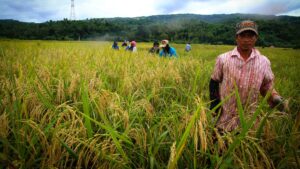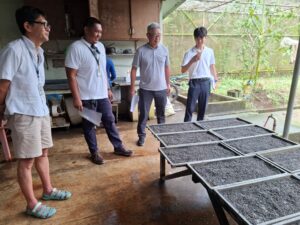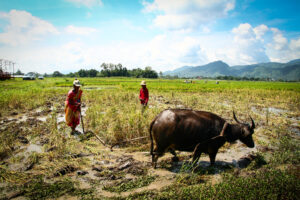by Ajay Kumar Mishra, Piyush Kumar Maurya, Pidikiti Pavithra, and Sheetal Sharma
Harishankar, a farmer from Varanasi in Uttar Pradesh, India had been practicing conventional farming for many years. However, he noticed a gradual decrease in the quality of his soil and farm produce. Using organic farming practices, he restored the health of his soil and improved its fertility over the years and his farm has become a thriving ecosystem with increased biodiversity and improved water retention capacity.

Recent trends show that farmers are shifting towards sustainable farming methods which, help restore the fertility of their soil and positively affect the productivity of their land. Conventional farming methods using harsh chemicals and pesticides not only degrade the soil’s fertility but also affect the whole food system by contaminating our food with toxic residues.
A farmer in search of sustainable options
Harishankar, a farmer from Varanasi in Uttar Pradesh, India. He has almost 5 hectares of land. He implements crop rotation with rice as the main crop. He also cultivates berseem, chickpea, and mustard as intercrops. He had been practicing conventional farming for many years. However, he noticed a gradual decrease in the quality of his soil and produce.
This led him to look for options that could help him restore and bring back the nutrients in his soil. His search ended when he decided to take up organic farming. Harishankar faced numerous challenges along the way. His decision to shift to sustainable farming methods was constantly questioned by members of his community. He also struggled because he lacked awareness and understanding of the subject in the initial stages. But, he was determined to towards his vision.
He attended many trainings and workshops, seeking knowledge from scientists and experts in the field. He learned about using organic inputs such as jeevamrut (biopesticide and organic manure), beejamrut (organic seed treatment solution), and farm yard manure for nutrient management, and neemastra (neem oil) for pest management.

A holistic approach to farming
Initially, he practiced organic farming on half of his land share. He diligently implemented these methods determined to rejuvenate his soil and promote sustainable agriculture. He gradually practiced organic farming on his entire land. Harishankar also keeps livestock and cattle on his farm. He utilized the manure and urine from his cows to make jeevamrut and beejamrut
Eventually, his hard work and dedication paid off. His holistic approach to nutrient management helped enrich the soil and control pests and diseases in his field, thereby reducing the need for agricultural chemical interventions. Over the years, he restored the health of his soil and improved its fertility through organic farming practices.
Today, he has been using organic farming practices for the past 15 years and his farm has become a thriving ecosystem with increased biodiversity and improved water-retention capacity. He also acknowledges the support from International Rice Research Institute for capacity development training and organic inputs for his farm.

A lasting legacy for the future
“I may not know the exact amount I will save in the bank for future generations,” Harishankar said. “But one thing I am sure of is my commitment to preserving organic carbon for them. I will not give in to using chemicals in my farming practices.”
No matter the challenges, he is determined to stick with organic farming.
“It’s all about sustainable agriculture for me, using natural methods like composting, crop rotation, and biological pest control,” he added. “I feel a deep responsibility toward the environment and the well-being of future generations. My priority is to preserve healthy, fertile soil through organic farming, leaving a legacy that promotes sustainability and an eco-friendly approach to farming.”
He acknowledges the challenges of selling organic produce as there is no standard market. He proactively urges the government to introduce schemes, subsidies on machinery, and incentives to promote organic farming among farmers.
A remarkable journey and a shining example
Harishankar’s farm is a shining example of how one person’s dedication to the environment and sustainable practices can create a positive impact. His unwavering commitment to organic farming has not only improved the health of his soil and the quality of his produce but has also inspired others to follow suit.
His journey is a testament to the power of sustainable agriculture in promoting a healthier and more sustainable future for our planet. He shares knowledge from training with fellow farmers, motivating them to embrace organic farming and promoting sustainability in his village.
“Crops sustain us; residue nourishes the earth – let us give back to the soil it gives us.”
Related stories
Modification of nutrient requirements for a four-crop-based cropping system to increase system productivity, maintain soil fertility, and achieve sustainable intensification
In Bangladesh, in terms of food security for the increasing population and the transformation of agrifood systems, the dominant double-cropping-based pattern of rice–rice is becoming less profitable and sustainable. Recent research found that a four-crop-based cropping system, which includes aus (pre-monsoon rice), aman (monsoon rice), lentil, and mungbean, was more profitable than the double or triple-crop cropping system, and farmers can easily follow this new system. This newly adopted cropping system may increase farm income while creating job opportunities, alleviating poverty, and ultimately creating positive changes in the farmers’ livelihoods.
How soil and climate-smart agriculture can fight climate change
The soil is the storehouse of the nutrients required by crops so, in a way, the entire living population depends on the health of the soil. But, to satisfy the growing demand for food security, vast areas of the world’s grasslands and forestlands have been converted for crop production with little regard to ecological balance. In addition, the resources necessary for ensuring the food security of the growing population have been misused and mismanaged causing a decline in soil quality and health.
Establishment of crops under minimal soil disturbance and crop residue retention in rice-based cropping system: Yield advantage, soil health improvement, and economic benefit
The beneficial farming principles of conservation agriculture are not yet adopted widely in rice-based cropping systems particularly in South Asia. A novel solution to overcome these problems can be non–puddled rice crop establishment practice which, in some environments and soils, has been reported to perform well in terms of yield increase, soil properties improvement, global warming mitigation, and economic return.






ऋषि और कृषि परम्परा के संवाहक के रूप में आप उत्कृष्ट कार्य कर रहे हैं, साथ ही साथ अन्य किसानों के लिए आप प्रेरणा के बड़े स्त्रोत भी है।
आपका यह भागीरथ प्रयास आगे चलकर सभी के लिए मील का पत्थर साबित होगा।
अनंत मंगल शुभकामनाएं……..
What parameters have been studied for improvement of soil health at farmer’s field after adopting 15 years of organic farming. That information will enhance the real Scientific knowledge.
We very much appreciate Dr Arora for flagging our organic farmer story, this farmer is already an organic certified form and getting many awards and getting high yields. On behalf of IRRI-SARC, we have collected soil samples from the organic and a nearby control plot to understand the soil dynamics and physicochemical and biological indicators. Once we have the data we are happy to share it with you, we are sure it will reflect an evidence-based message.